Do you feel like there are so many things and tasks to do, but you just can’t seem to get them all done? We all have the same 24 hours a day. But, why is it that some people seem to be able to get the most out of every day and accomplish so much in life, while most people just can’t seem to find time to get things done?
In this guide, I’m going to share with you 5 powerful work management tips to help boost your productivity.
If you want to accomplish more in every area of life, you need to learn how to manage your work.
And to do so, you need to understand one thing: Stop focusing on quantity, instead, start focusing on quality.
It is not about how much work or if you can get 100 tasks done in a day, it is about how effective you are. In other words, it is about doing quality work.
More isn’t always merrier.
Let me give you an example. You can be busy the entire day, but at the end of the day, you’re still not making much progress because you are busy working on the wrong thing.
Similarly, you can be productive by focusing on and getting the RIGHT work done. And with that, you create real results and progress forward faster than you can imagine. Plus, you can still have plenty of free time left for play and to do other stuff.
Always remember this quote:
Your direction is more important than your speed.
Richard L. Evans
If you are on the wrong direction, running faster only get you to the wrong place, faster.
Hence, you want to make sure what you do is the right work to do.
Now you understand the fundamental principle to be productive, it is time to learn the 5 techniques how to manage your work so that you can get more done…
1. The “Play After Work” Principle

Imagine that when you are just about to do your work, and you see an interesting video on Facebook, it is just a 3 minutes video and shared by someone interesting too.
So you decide to check it out since it is just a short 3 minutes video, you can always get back to your work after that.
You watch the video, you laugh, and you enjoy it very much. At the end of the video, there is another recommended video. Another 3 minutes long “interesting” video. So you watch that too.
After watching all the videos, you noticed you have wasted 30 minutes on videos, and now it is time to get to your work. But now you feel thirsty.
Thus, you get to the pantry to drink some water. On the way to the pantry, you see your colleague, and you both talk for 10 minutes.
After you drink the water and get back to your workplace, you discovered that you have wasted 40 minutes.
You wanted to start your work, but you feel a little tired. And the task you are going to tackle is too heavy and require too much of your time.
Hence, you choose to do another task that is easier and simpler to tackle.
After you get those simple tasks done, it is time for you to work on your main task, but you don’t feel motivated and this time, you feel sleepy to even want to do it.
So you leave the main task to the next day. And the same thing repeats again the following days.
Does this sound familiar?
What you choose to do FIRST is of utmost importance. The reason is that our willpower and motivation are like the battery bar on your phone.
When you do something, take action, or make a decision, you use some of your willpower.
Therefore, if you choose to work on menial tasks first, you will use up your energy and will eventually feel tired and no motivation for the more important tasks.
This is why successful people often tackle the most important tasks the first thing in the morning.
It is just like you choose to eat the dessert first when you go for dinner.
If you fill your stomach with dessert and guess what, after that, you don’t have the appetite for the main course anymore.
You feel full and you can’t finish your main dish.
The same principle applies to your work. When you choose to work on less important tasks or play first, you will use up your willpower and might feel tired when it comes to doing the important tasks.
So, use the “play after work” principle to manage your work.
Choose to work on your most important task first before you do other things. Don’t watch TV or check Facebook first.
Do your work first, and then you get to play.
If you try to check the emails or Facebook the first thing in the morning, you will discover that you will get lost in the whirlwind of distractions.
It happened to me many times. When I check Facebook for updates, I saw someone shared an interesting vide. And every time I choose to watch any of those so-called ‘interesting’ video, I will end up watching more of those.
This is because it is so easy to scroll down and watch another video. When the convenience is there, you will end up checking another video.
Never let that happen to you.
If you check Facebook or email the first thing in the morning, you will feel tired, mentally and emotionally.
And after that, you won’t have the energy and motivation to work on what’s important.
Do you get that?
Don’t eat the dessert before you take your dinner. Don’t play or enjoy before you get your work done.
I learn this principle from his best-selling book, The Now Habit, written by professor Neil Fiore. You will also learn how to overcome procrastination and enjoy guilt-free play.
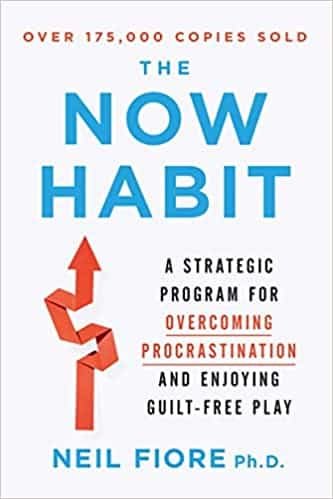
2. The Eisenhower Box Method
The Eisenhower Box method may sound like a complicated work management technique, but it is not.
Look at this image below and you will understand how it works.
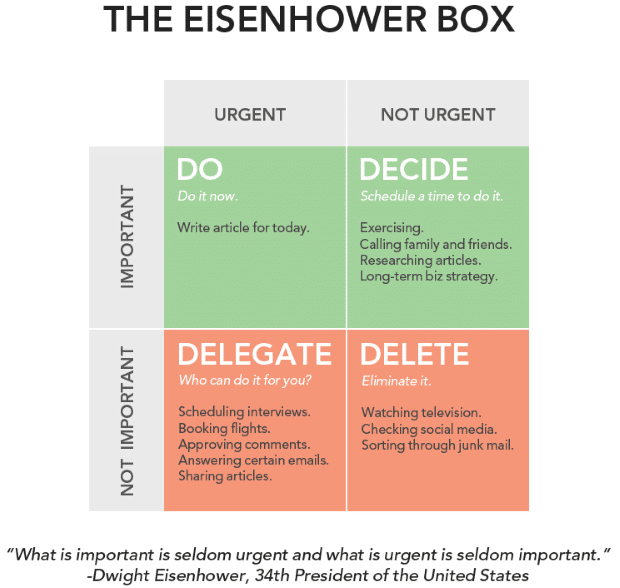
Basically, all your tasks can be categorized into the 4 quadrants showed in the Eisenhower Box.
What you need to do is simple, just list down all your tasks and fill them into the box.
Your tasks will be categorized into:
- Urgent and important
- Urgent but not important
- Not urgent but important
- Not urgent and not important
After you have filled in all your tasks into the box, you will clearly see which task you should tackle first.
- Urgent and important – Do these tasks immediately
- Urgent but not important – Outsource or delegate
- Not urgent but important – Schedule and plan time for it
- Not urgent and not important – Eliminate these tasks
Once you have put down all your tasks into these 4 quadrants, you will discover that most of the tasks that will move you toward your goals and your dreams are those that fall under the ‘important’ category.
Menial tasks such as approving blog comments, checking Facebook, booking flights, check company stock price, pay bills, etc. fall under the not important category.
So, focus on doing the important tasks and choose to work on those urgent ones first.
If you follow the Eisenhower Box method, you will discover that you are working on tasks that will give you the most result.
Stop working for the sake of getting things done.
Not all tasks are created equal. Some important tasks give you the most result, on the other hand, most menial tasks are just time wasters.
As what I mentioned above, we only have 24 hours a day. And it is not about how much time you can get that count, it is about doing the most result-yielding task so that you can make the most progress.
Therefore, don’t just do whatever tasks that are given to you.
Categorize and prioritize them. Understand what work should come first and what you should delay.
Read: How To Deal With Urgent VS Important Work Using The Eisenhower Box Matrix
3. Write and Schedule It

If you want to get things done, what you need to do then is to write them done and schedule them.
Whatever you write down, you remember. And whatever gets scheduled, gets done.
You don’t need a complicated work management technique. As long as the technique works, it can be as simple as using a pen and a piece of paper.
All you need to do is to just write down your tasks and plan for your day.
I found that writing down my to-do list on a piece of paper can be as effective as using Apps or any other complicated software.
The key from writing down your tasks is so that you will never forget about them.
Think about it, most people write down their goals only once, and then they forget about them and they do nothing about them.
No wonder most people fail to achieve their goals.
Don’t let this happen to you. Get yourself a pen and a paper, or a notebook, write down your tasks and whatever ideas that come to you.
Do you know that business tycoon, Richard Branson always carries his notebook wherever he goes? He said that it will be easier for him to refer, to jot down, and to NOT forget about interesting ideas and important tasks.
This is what Branson writes in his blog post:
I’ve often written about my love of writing lists – and this one shows I’ve been at it since the very beginning. Lists not only provide great structure for getting things done, but they also help us to set goals and achieve our dreams.
Richard Branson
This pen and paper method is simple and easy to apply. And more importantly, it doesn’t take a rocket scientist to do it, anyone can do it, and you can do it too.
Remember, the key to making all the work management techniques to work is constantly reminding yourself about your tasks and work on them.
This is why people choose to write down their tasks rather than just remembering it in their heads.
When you know what you need to do and how to go through your day, you will become more effective and proactive.
Hence, write down your tasks, make a to-do list, and then schedule your work.
Read: 10 Super Tips How to Create an Effective To-Do List
4. Batching Similar Tasks

One of the best methods to manage your work and your tasks is through batching.
It is a simple concept, yet, most people never really think about batching when it comes to getting things done.
As an example, I’m a blogger, so what I do every month is that I will generate all the article ideas in one go. Of course, I will add new ideas and titles whenever I want, but usually, I generate all the ideas and what I want to publish in one go.
This way, you don’t have to crack your head to think about what to type or what to publish in your blog each day.
So once I have got my content editor done, all I do each day is to focus on the writing.
When I was in real estate doing cold calling in the office years ago, I applied the same principle to the work.
I will call all the potential clients on the list in one go. And whenever I got an interested client, I will put a remark and do the follow up later.
So, can you batch your work instead of doing it differently at different times?
Batching similar work together will save you plenty of time because you are trying to do everything in a similar manner at the same time.
Instead of switching from one task to another, you batch all the similar tasks together and do it in one go. And once you’re done, you can then switch to another type of work.
List down your tasks and try to batch them together right now. And then create a schedule and batch your work together.
When you don’t jump from one task to another, you are saving yourself a lot of your energy and willpower.
According to this article from Rescue Time, context switching can kill up to 80% of your productive time. The article also shared an interesting study on the cost of context switching:
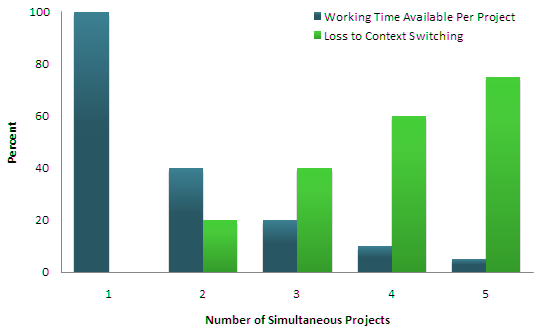
From the graph above:
- Focusing on one task at a time = 100% of your productive time available
- Juggling two tasks at a time = 40% of your productive time for each and 20% lost to context switching
- Juggling three tasks at a time = 20% of your productive time for each and 40% lost to context switching
In conclusion, if you want to be productive, focus on doing just one task at a time. Stop multi-tasking and don’t work on a few projects/tasks at the same time.
This is why batching is helpful too.
5. Harness The Power of Absolute Focus

As I shared above, to get the most out of your performance, you need to focus. You can’t afford to scatter your energy and try to focus on 10 things at a time. It won’t work.
When it comes to managing your work and your tasks and getting things done, we just cannot ignore the power of focus.
Too much time has been wasted on unnecessary work and distractions around us every day.
Think about it, how much time do you spend on Facebook checking updates? How much time do you waste on watching TV and how much time did you waste talking about things that don’t matter with people who you don’t care much?
I’m not saying that you should become a robot and work 24 hours, but I’m suggesting you spend less time on unnecessary things and get less distracted.
And in order to do that, you need to harness the power of focus.
Here are some suggestions you can follow:
Never Multitask:
Multitasking has been proven to be ineffective and it actually lowers your productivity rather than increasing it.
Our brains cannot focus on two things at the same time.
When we try to do a few things at the same time, what really happens in our brain is that we tend to switch from one task to another, not doing them all simultaneously.
Even when I’m listening to music while writing an article, when I truly focus, the music in the background faded and I’m all about writing the article.
I believe you have experienced a similar situation before. Our brain can only focus on doing one thing at a time, so don’t jam it.
Time Blocking:
This is a very powerful technique that can help anyone to achieve absolute focus in doing their work.
You simply time blocked your task. If you want to cold call, time block it. Say, from 9am to 11am, you block this 2 hours just for doing the cold calling and nothing else.
If you want to be a writer, simply time block your writing time. Block your time to do the work that matters most.
Read: Time Block: The Technique For Superb Focus And Productivity
Distraction-Free Environment:
Create a distraction-free environment when you need to focus on your work. Lock yourself in your office or get to a quiet place that nobody can reach you when you work.
Try to switch off your phone or silence it. Your productivity will improve significantly when there is no distraction around.
If you have to work with your computer, disconnect yourself from the internet when necessary. Try to restrict yourself with the accessibility to social media when possible.
Read: 9 Tips How to Change Your Environment for Greater Motivation
Conclusion
If you are serious about being productive and get more done, these 5 techniques are going to help extremely powerful to you.
Apply them and use them to manage your work right away.
Remember, don’t eat the dessert before you have your dinner. Do the most important work first and write down what you need to do. Batch similar work together to save time and when you work, work, stay focused on your work.
I hope this article will be helpful to you and boost your productivity. If you like this article, remember to share it with others too.
So are you already using these techniques to manage your work? Share your thoughts with me in the comment section below.
Cheers.
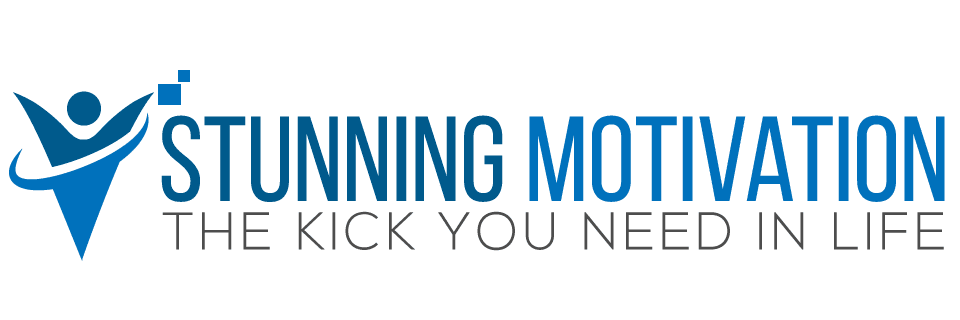

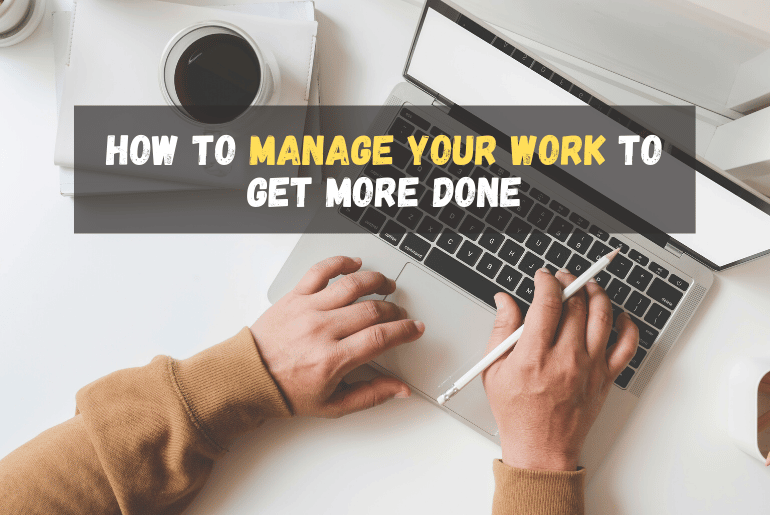
Every word of this article is fascinating and educative.. really loved it!
Keep up the good work Shawn!
Great to have your comment here, Joseph.
[…] increased work productivity, it is essential to keep workers comfortable and happy, one of the ways to do that is getting the […]
[…] Having short-term goals can be very effective. This is because you already know what to do and you can go through each day without wasting much time figuring out what to do. Short-term goals make you more effective and they help you in getting things done. […]